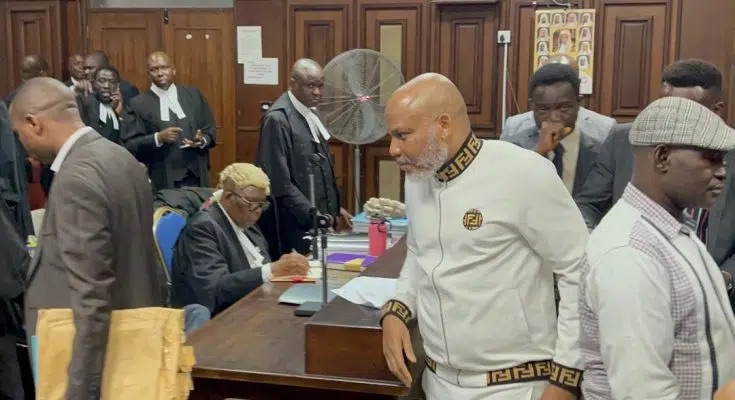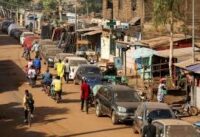Nigerian separatist leader Nnamdi Kanu, the head of the outlawed Indigenous People of Biafra (IPOB), has dismissed his legal team and announced that he will represent himself in his ongoing terrorism trial. The 58-year-old made the declaration as he opened his defence on Thursday, arguing that the Federal High Court in Abuja lacked jurisdiction to try him — an argument that the presiding judge swiftly rejected. Kanu, who faces charges of terrorism and incitement to violence, continues to deny all allegations brought against him by the Nigerian government.
Kanu’s decision to sack his lawyers comes barely 24 hours after he submitted a list of high-profile Nigerians as witnesses, including former Attorney General Abubakar Malami, who held office at the time of his controversial arrest in 2021. The reasons for his decision remain unclear, and his former legal representatives have yet to issue any public comment.
Kanu, who also holds British citizenship, told the court that his continued detention despite a Court of Appeal ruling ordering the charges against him to be dropped amounts to contempt of court by the Nigerian government. Although the appellate court dismissed the charges in 2022, the Supreme Court later reinstated them, allowing the case to proceed. The trial judge, however, ruled that the matter of jurisdiction had already been settled during earlier hearings and directed Kanu to begin his defence.
Earlier this week, Nigerian police dispersed a group of protesters in Abuja with tear gas as they called for Kanu’s immediate release. Despite repeated arrests and legal battles with the federal government, Kanu remains a highly influential figure, particularly in southeastern Nigeria, where many view him as a freedom fighter championing the cause of the long-defunct Biafran Republic.
IPOB, which Kanu founded, was officially banned in 2017 after being labelled a terrorist organisation. Its armed wing, the Eastern Security Network (ESN), has since been accused of violent attacks, including killings and arson in parts of the southeast. Kanu’s troubles with Nigerian authorities date back to October 2015, when he was first arrested on terrorism charges. He was granted bail in 2017 but fled the country after a military raid on his residence. His bail was revoked in March 2019, and an order for his re-arrest was issued. In 2021, the Nigerian government announced that he had been re-arrested, with reports indicating he was detained in Kenya — though Kenyan authorities have never confirmed any involvement in his extradition.
As his trial resumes, the controversial leader’s decision to represent himself adds a dramatic twist to one of Nigeria’s most closely watched cases. With tensions still high in the southeast and his supporters demanding his release, Nnamdi Kanu’s latest move could reshape the legal and political battle over Biafra’s independence movement.














Leave a comment